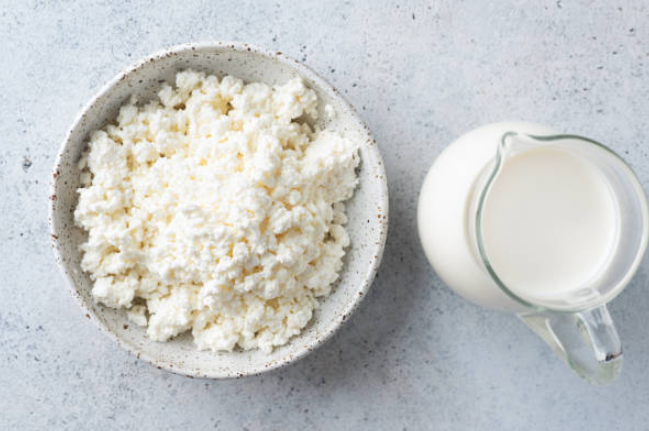Why on earth is cottage cheese so good for you? It has a particular benefit that sets it apart from other options in dairy cabinets.
Maximum Health Benefits of Cottage Cheese
Without a doubt, Harbstreet says, cheese’s biggest health benefit to the table is that it’s a good source of protein. A serving of cottage cheese contains 11 grams of protein, more than most other yogurts. For example, plain yogurt made from the same serving of whole milk contains about 4 grams of protein. The only type of yogurt with a comparable protein content is Greek yogurt, which contains 10 grams of protein per serving.
Protein is important for providing energy and fullness to the body. If your meal or snack doesn’t have enough protein, you can bet you’ll reach into the fridge for something else to eat sooner than you think. Scientific studies have also shown that people who eat a high-protein diet are more likely to lose weight than those who don’t.
In general, a good goal for daily protein is 20 grams per 7 pounds of body weight. This means, for example, that a person weighing 150 pounds should consume 50 grams of protein per day.
While the protein in cottage cheese may be its greatest health benefit, it’s certainly not the only benefit.
Other Benefits of Including Cottage Cheese in Your Diet
Maggie Michalczyk, RDN, a registered dietitian and founder of Once Upon a Time with Pumpkins, agrees with Harbstreet that the protein content of cottage cheese is a major benefit. But another reason cottage cheese is so beneficial, she says, is that it contains probiotics that support healthy digestion. Probiotic foods, such as cottage cheese, have a wide range of benefits, including supporting immune health, mental health, and may even help prevent certain diseases.
“In addition to the protein and probiotic components of cheese, it’s also rich in nutrients like calcium, vitamin B12, and selenium,” says Michalczyk. Calcium is an important nutrient for bone health, and getting enough vitamin B12 and selenium is also important for preventing fatigue, just one of the nutrients’ roles.
Despite its nutritional value, both dietitians say it’s best paired with other nutrient-dense foods for a well-rounded diet. “While cottage cheese can be eaten as a snack on its own, it’s important to note that, depending on the variety, it may not have enough carbohydrates or fat to satisfy the need for breakfast,” Harbstreet says. “The good news is that there are many ways to enjoy it with other foods to fill gaps in these macronutrients, such as mixing it into smoothies or pancake batter, spreading it on toast, eating it with canned, frozen or fresh fruit, or folding it into scrambled eggs,” she said. Michalczyk agrees, saying that cottage cheese can be incorporated into both sweet and savory recipes, making it versatile and easy to add to a balanced diet.
Mihachik says that when buying cottage cheese, look for one that is not flavored, because flavored cheese often contains added sugar. Instead, she recommends buying plain cheese and sweetening it at home with fruit or a little honey. Harbstreet says to look for low-sodium cheese. She also says to choose a texture that suits your taste: cheese with small curds is smoother than cheese with large curds.
While cottage cheese is a healthy food, Harbstreet stresses that it should not be seen as a quick fix for weight loss or other health goals. “Think of it as one of the many options in the overall diet, and if you don’t like eating it, you can also get the nutrients in cottage cheese from other foods,” she says.
No single food can meet all of our nutritional needs, but cottage cheese is a food worth prioritizing. Due to its popularity on social media, there are also plenty of recipes to discover. Your body and taste buds will benefit.


